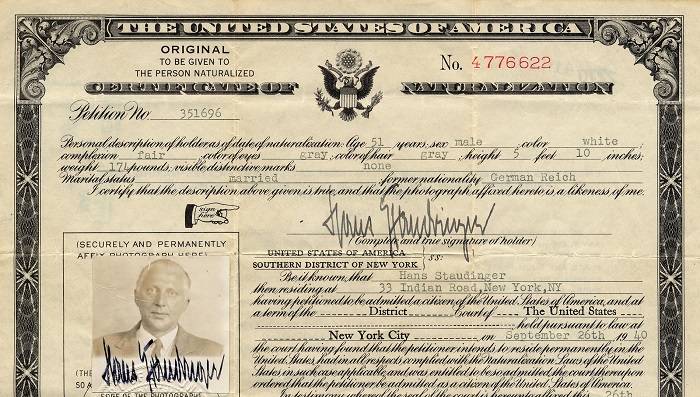Records from legal battles and restitution claims of Albert (Leser) Lestoque and his two siblings, for family properties in the Plittersdorf section of Bonn, Germany. Also contains manuscripts and published versions of Lestoque's writings, including the manuscripts from lecture engagements, and materials from organizations as Citizens for Victory, the International Committee for the Study of European Questions and the German American Writers' Association (GAWA).
Collections : [German and Jewish Intellectual Émigré Collections]
German and Jewish Intellectual Émigré Collections
Personal and professional papers of German-speaking Émigré in the social sciences, humanities, and the arts and the organizations which assisted those who fled the Nazi regime.
In recognition of the serious scholarly interest in the mass migration of German speaking exiles from the Nazi regime, a German and Jewish Intellectual Émigré Collection was established in 1976 at the University at Albany, State University of New York. This growing collection has been developed since the 1970s through the efforts of the University Libraries and Professor John M. Spalek of the University's Germanic and Slavic Languages and Literature Department
Search Constraints
Start Over You searched for: Online Content Online Content Remove constraint Online Content: Online Content Collecting Area German and Jewish Intellectual Émigré Collections Remove constraint Collecting Area: German and Jewish Intellectual Émigré Collections Subject Literature Remove constraint Subject: Literature
1 - 8 of 8 entries
Search Results
Carl Misch Papers, 1941-1963 0.5 cubic ft.
Correspondence in German, 1941-1962; and typescripts of articles and lectures, in German and English, on Germany, Paris, prominent individuals, and other topics, 1945-1963.
Erich Maria Remarque Papers, 1938-1973 0.25 cubic ft.
The collection consists of correspondence, newspaper clippings and magazine articles, 1938-1973, related to the career of Erich Maria Remarque, a German-born writer most famous for his 1929 work All Quiet on the Western Front.
Hans Natonek Papers, 1918-1964 3.25 cubic ft.
The Hans Natonek Papers contain drafts of his novels, short stories and poems, and correspondence with family and publishers. The bulk of the literary works in this collection, though undated, stem from the period after Natonek fled to the United States, mainly after he moved to Arizona in 1943.
Karl O. Paetel Papers, 1904-1984 70 cubic ft.
Karl Otto Paetel was a political journalist, born in Berlin, forced to flee Germany in 1935 (Paetel was sentenced to death in absentia by the Nazis), and immigrated to the United States in 1940. Paetel's interests focused on the radical movements and social changes in the Twentieth Century from his youth until his death in 1975. The collection consists of correspondence, Paetel's writings, writings by others, pamphlets, biographical materials, and periodicals.
Oskar Maria Graf Papers, 1891-1967 9 cubic ft.
The Oskar Maria Graf Papers consist primarily of photocopies of Graf's works. This includes correspondence; writing; newspaper clippings about Graf; exhibitions about Graf; numerous photographs of Graf, his family and acquaintances; and subject files.
Roy C. Bates (Kurt Bauchwitz) Papers, 1890-2006 19 cubic ft.
This collection documents the literary and legal careers of Roy C. Bates (Kurt Bauchwitz). The materials cover his early years in Germany (1890-1938), the years of flight from Hitler's Germany via Japan to the United States (1938-1941), and his U.S. years (1941-1974).
Vicki Baum Papers, 1929-1959 0.33 cubic ft.
This collection contains Vicki Baum's correspondece related to publishing between 1929 and 1959 and notes and synopses of four of her manuscripts.
